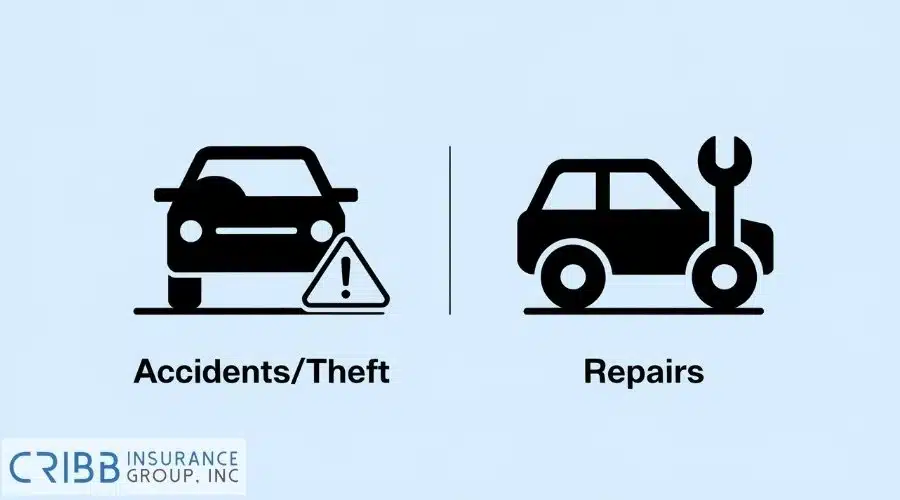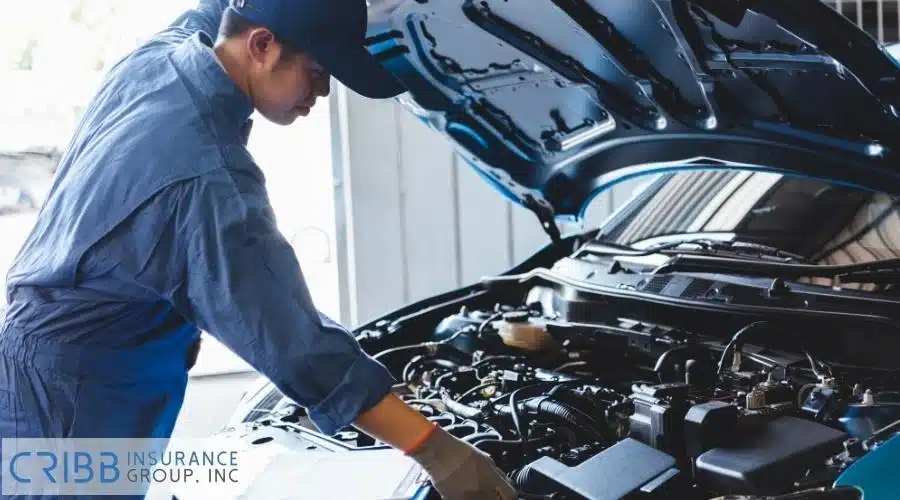Understanding the difference between car insurance vs warranty is key to protecting your vehicle and finances. These two types of coverage serve distinct purposes: car insurance safeguards against accidents, theft, and liability, while warranties cover mechanical issues and repairs. Together, they offer comprehensive vehicle protection options. Let’s explore each in detail and help you make the right choice.

What Is Car Insurance and Why Is It Important?
Car insurance is a contract between you and an insurance provider that protects you financially in case of accidents, theft, or damage caused to others. It’s legally required in most states and offers several types of coverage depending on your needs.
Types of Car Insurance Coverage
Understanding your options is critical when choosing the right policy. Here are the most common types:
- Liability Insurance: Covers damage or injury you cause to others.
- Collision Coverage: Helps pay for repairs to your car after an accident.
- Comprehensive Coverage: Protects against non-collision incidents like theft or weather damage.
- Uninsured/Underinsured Motorist Coverage: Covers damages caused by drivers without sufficient insurance.
According to the Insurance Information Institute, approximately 80% of insured drivers purchase comprehensive coverage, and 76% opt for collision coverage, highlighting the importance of broad protection.
Understanding Car Warranty Coverage: What You Need to Know
A car warranty is a manufacturer or provider’s commitment to cover specific repairs due to mechanical failures or defects. Unlike car insurance, warranties are not legally required but can save significant repair costs over time.

Types of Car Warranties
Not all warranties are the same. Whether you’re purchasing a new car or exploring options for a used vehicle, understanding the different types of warranties can help you choose the right coverage for your needs.
- Manufacturer Warranty: Often included with new vehicles, this covers repairs for mechanical defects for a specific period, typically three to five years or up to 60,000 miles.
- Extended Warranty: Available after the factory warranty expires, offering extended protection against breakdowns.
- Bumper-to-Bumper Warranty: Covers most vehicle components, excluding wear-and-tear items like tires and brakes.
- Powertrain Warranty: Protects the engine, transmission, and drivetrain, which are critical for your vehicle’s operation.
Extended warranties provide valuable protection for those considering a warranty for used cars. In fact, the market size for the extended auto warranty industry in 2023 was $20.5 billion, although it has seen a slight annual decline of 1% since 2018, according to ConsumerAffairs.
Warranty Coverage for Used Cars
Used cars often come with limited warranties or require purchasing an extended warranty. If you’re wondering, “Should I get a warranty on a used car?”—the answer depends on factors like vehicle age, mileage, and maintenance history.
Key Differences Between Car Insurance and Car Warranties
When it comes to car insurance vs warranty, it’s important to understand their distinct roles. While insurance focuses on external damage and liability, warranties aim for internal mechanical protection.
| Aspect | Car Insurance | Car Warranty |
| Purpose | Covers accidents, theft, and third-party damages | Covers repairs for mechanical issues |
| Requirement | Legally required | Optional |
| Duration | Renews every 6-12 months | Fixed term, often 3-5 years |
| Coverage Scope | Broad, external damages | Specific, mechanical failures |
Both play vital roles in ensuring comprehensive coverage for your vehicle. Knowing how long does a warranty last or when your insurance renews helps you stay ahead.
Extended Warranties: Are They Worth It?
This type of coverage offers peace of mind by covering repair costs after the manufacturer’s warranty ends. Companies like Endurance and Good Sam Auto Warranty specialize in these services. However, not all extended warranties are created equal.
What Does an Extended Warranty Cover?
An extended warranty can save you from costly repair bills, but not everything is included. Here’s a closer look at what extended warranties typically cover—and what they don’t.
Extended warranties often include:
- Major mechanical systems such as the engine or transmission
- Roadside assistance services
- Repairs at authorized service centers
However, extended warranties often exclude routine maintenance and wear-and-tear items. Always read the terms carefully to understand what’s included.
Benefits of Extended Warranties
- Protection from unexpected repair costs
- Access to services like roadside assistance
- Extended peace of mind for vehicle owners
Considering factors like types of auto warranties and your vehicle’s condition can help determine if an extended warranty is right for you.

Common Questions About Extended Warranties
Extended warranties can be confusing, especially if you’re unsure what they include or whether they’re worth it. Here are answers to some of the most frequently asked questions to clarify doubts.
- What does a car warranty cover?
A car warranty typically covers mechanical failures and defects but not routine maintenance or wear-and-tear items. - Is car insurance the same as a car warranty?
Car insurance covers accidents and third-party damages, while a warranty covers mechanical repairs. - Can I purchase a warranty for a used car?
Many providers offer extended warranties for used cars, covering major repairs and breakdowns.
Making the Right Choice for Your Vehicle
Deciding between car insurance vs warranty isn’t an either/or situation—it’s about understanding what each covers and how they complement each other. Car insurance protects against accidents and liabilities, while warranties handle mechanical issues.
If you’re buying a used car, consider adding an extended car warranty for used cars to your protection plan. It can save you from hefty repair bills down the road.

Why Trust Cribb Insurance Group Inc?
At Cribb Insurance Group Inc in Bentonville, AR, we’re dedicated to helping clients understand their vehicle protection options. Whether you need reliable car insurance or guidance on choosing the right warranty, our team is here to provide trusted advice tailored to your needs. Let us help you navigate your choices with confidence.
Frequently Asked Questions
What are the most common items covered under a car warranty?
Car warranties typically cover mechanical components like the engine, transmission, drivetrain, and electrical systems. They generally exclude wear-and-tear items such as brake pads, tires, and windshield wipers.
How do extended warranties differ from manufacturer warranties?
Manufacturer warranties are included with new vehicles and cover defects for a limited period (e.g., three to five years). Extended warranties, purchased separately, extend this coverage beyond the initial term and often include additional benefits like roadside assistance.
Can I transfer a car warranty to a new owner if I sell my vehicle?
Many car warranties, including some manufacturer and extended warranties, are transferable to a new owner. This can increase the resale value of your car, but it’s essential to check the terms of your specific warranty.
What’s the difference between powertrain and bumper-to-bumper warranties?
A powertrain warranty covers essential parts like the engine, transmission, and drivetrain. A bumper-to-bumper warranty provides broader coverage, including most components between the front and rear bumpers, except wear-and-tear items.
When is the best time to purchase an extended warranty?
The ideal time to purchase an extended warranty is before the manufacturer warranty expires. Buying early often provides better coverage options and avoids gaps in protection for your vehicle.
Protect Your Vehicle Today
For reliable car insurance options and advice on selecting the right car warranty, contact Cribb Insurance Group Inc. Our team is ready to provide expert recommendations tailored to your needs. Let us help you stay protected on the road.





